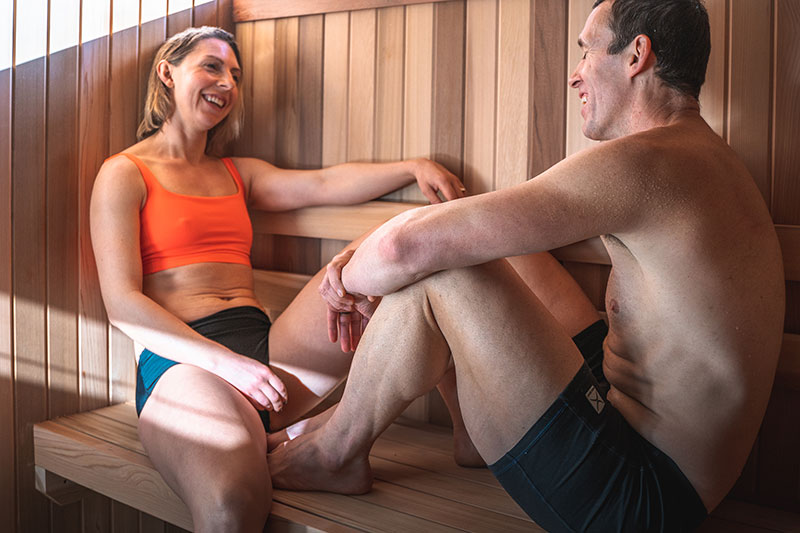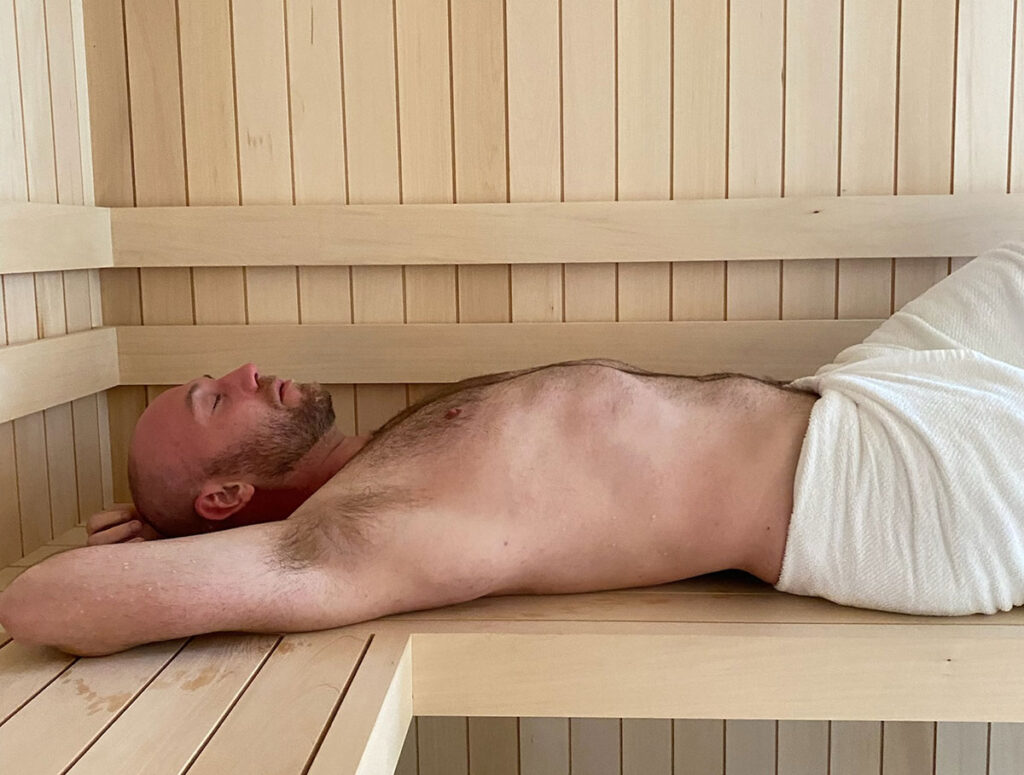Sweating as a Super Power

Warmer weather is approaching, and we are thinking about heat, how our bodies react and why we sweat. Those who sauna can appreciate the benefits of a good sweat, and many of the positive health effects that come with it.
Dogs pant, seals pee on their fins to cool down, but it is human’s unique ability to sweat from our biggest organ that sets us apart from other species. Journalism professor and author, Sarah Everts‘ book The Joy of Sweat: The Strange Science of Perspiration explores the complex and fascinating science behind sweating, an adaptive evolutionary tool that gave us humans a competitive edge. Is sweating healthy? Our ability to run long distances on two feet while keeping cool made us better equipped to hunt down prey or gather food under the hot sun. While some may deem sweating as an unsavoury topic, Everts’ excitement over the topic is evident, each chapter includes an in-depth look at the historic and scientific findings along with interesting anecdotes.
But have you ever wondered, what is sweat, exactly? Sweat is made up of almost 99 percent water with trace amounts of salt, sugar, ammonia and urea. Everts explains “the human body is inherently leaky.” Food and drugs percolate from what’s currently in our bloodstream. Basically anything in your blood that’s small can percolate out of your sweat, such as nicotine, alcohol and traces of that strong espresso you just drank. Everts gives a unique visual that is guaranteed to stay with you; imagine 8 billion citizens of planet Earth stepping out of a sauna at the same time, according to her calculations, it could produce enough fluid to power Niagara Falls.
Sweat, also called perspiration, comes from (mostly) two kinds of glands; the eccrine glands which are found all over your body, (normally clear and odourless), and the stronger smelling sweat that comes from our apocrine glands (found in our armpits and other places). Everts describes our sweat glands as tiny elongated tubas running along our skin. Humans are born with between 2-5 million sweat pores. “Collectively, our species’ sweat glands number in the quadrillions — more than there are stars in the Milky Way,” says Everts. And there is evidence that both genetics and the climate may have an effect on how much we sweat. So if you live in a hot place, your body may become more efficient at regulating your temperature.
Besides regulating our body temperature, there is some evidence that healthy sweating from saunas can improve heart health. Everts describes one particular study with Finnish men who regularly used saunas four times a week. Therapeutic sweating in saunas increases blood flow to vital organs and some studies indicate this may help excrete toxins like bisphenol A (BPA) and other heavy metals like cadmium, arsenic, mercury and lead. Although it is yet to be determined as to how this affects human health. Everts stresses it is primarily our excretory organs like our kidneys and liver that are involved in the detoxification of waste from our systems.
A few benefits of regular sauna bathing include:
1) If summer heat is taking its toll on you, practicing heat acclimation with sauna can help your body adapt to hotter temperatures by training its natural response to heat stress. Through consistent sauna sessions, you’ll see a reduction in heart rate, internal body temperature responses, and sweat electrolyte concentrations. It may seem gradual, but with every session you’ll start to see a difference as you build up a tolerance to the heat.
2) Sauna sessions help you relax and manage stress all year long. Studies have shown that sauna sessions decrease cortisol levels (our stress hormone) in the body.
3) Hot /cold contrast therapy improves sleep quality — even on hot summer nights. Increasing the amount of deep sleep we get can in turn improve memory and problem-solving abilities.
4) Even on hot days, sauna bathing has an immediate positive effect on blood pressure.
5) Spending time in the sauna can improve mental well-being through reconnection and community (no phone distractions in a sauna!). Multiple studies have shown improvements in mental health through the Finnish tradition of sauna and hydrotherapy.
6) Reduces muscle aches. Blood vessels relax and dilate in a sauna, blood flow increases, helping reduce tension in the joints and relieve soreness.

The average person can sweat out a pint (0.5 liters) of water during a short stint in a sauna. One study indicates that the removal of toxins by heavy sweating has the ability to improve overall health in individuals and can even help with some diseases. Regular sweating in saunas can also benefit some skin conditions. Sweating can cleanse pores by pushing out impurities like bacteria which can improve acne and other skin problems. Although it’s important to wash your face both before and after with cool water and hydrate well with fresh water after a visit to the sauna.
Everts’ book delves into the history of sweat and the many unique aspects of how other species regulate their body temperature, (many in very bizarre ways). And although Everts doesn’t believe that sweating is important for detoxification – she still purports that healthy sweating is a superpower in its own right. Our ability to regulate body temperature, this magical cooling effect on our skin is the main function of sweat. “Our cooling down system is as critical to our continued existence as breathing,” says Everts.
Study: Mahlouji, Mahboubeh et al. “Sweating as a Preventive Care and Treatment Strategy in Traditional Persian Medicine.” Galen medical journal vol. 9 e2003. 25 Dec. 2020, doi:10.31661/gmj.v9i0.2003